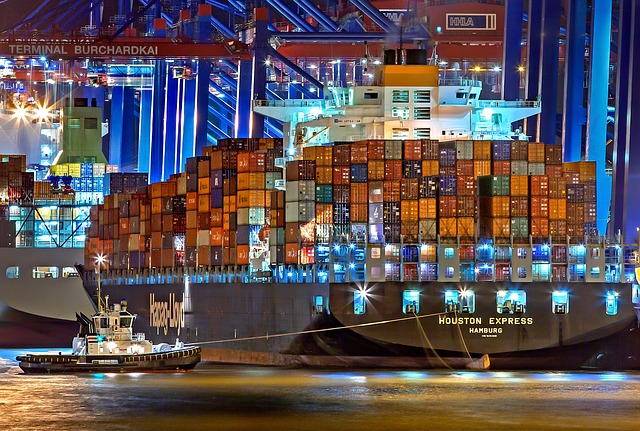By J.M. Phelps (One News Now)
Could standard cargo containers transported by the millions around the world be Trojan horses for something more sinister? America may be facing a hidden imminent danger unbeknownst to the average citizen.
Since the era of President Ronald Reagan and the Soviet Union’s “evil empire,” the United States has attempted to adequately maintain a missile defense system on the West Coast. For example, there is a missile defense facility at both Fort Greely, Alaska, and Vandenberg Air Force Base, California. “There are, however, no ground-based missile defense facilities to protect the most populous part of the nation, the Eastern one third,” states Vann Hipp in his book, The New Terrorism.
From U.S. Navy ships in the offshore waters of the Atlantic Ocean, Aegis Ballistic Missile Defense systems (BMDs) can track and intercept incoming short-range missiles. However, are they equipped to counter a threat that could be clandestinely driven into our homeland via Port Canaveral, Florida, for example?
Investigative journalists Mary Fanning and Alan Jones released the first of two occasional papers with the Center for Security Policy in late 2016. The paper entitled “What Could Possibly Go Wrong?” described a 35-year lease to operate the cargo container terminal at Port Canaveral, Florida. In 2014, the United States awarded a company called Gulftainer the lease that spans three and a half decades. Is it a coincidence during this timeframe that the Committee on Foreign Investment in the United States (CFIUS) also permitted the Uranium One deal?
Ordinarily, any kind of foreign purchase, acquisition, or lease of national security concern would go before CFIUS. It must be noted Aimen Nabi Mir was the CFIUS staff chairpersonfrom 2007 to 2014. Clare Lopez, vice president for research and analysis at the Center for Security Policy says: “Mir has family connections to the Pakistani intelligence service, as well as his own direct contact with the U.S. Muslim Brotherhood. This is troubling and might have something to do with the failure of the CFIUS review and oversight process.”
What is more, Gulftainer is based in the United Arab Emirates (UAE) and is co-owned by the Emir of Sharjah, UAE, and the brother of Dr. Jafar Dhia Jafar, who was Saddam Hussein’s top nuclear scientist, whose nuclear program was covertly sponsored by Russia. Dr. Jafar was an Iraqi regime official who could have been engaged as a military target during Operation Iraqi Freedom. He has also been credited with designing the “Beach Ball,” a miniaturized nuclear weapon that can sit inside the nose cone of an intercontinental ballistic missile (ICBM), according to Lopez.
“During the lead up to the 2003 Iraqi Freedom invasion by the U.S. and our coalition partners, Russia came in and helped remove all kinds of incriminating evidence, including nuclear programs, devices, materials, and documents,” says Lopez. This is extremely alarming, as she reports this would have also included the blueprints for the so-called “Beach Ball.”
The second occasional paper – “The Perfect Storm” by Fanning and Jones – was published by the Center for Security Policy in 2017 and contains additional alarming information. The new information discloses Gulftainer is in a joint-venture with a Russian company, Konstern-Morinformsistem-Agat, that produces the Club-K container cruise missile launch system.
The Club-K containers look identical to the standard 40-foot ocean containers that are transported by ships, offloaded at cargo container facilities, then transported by a train or semi-trucks by the millions around the globe. However, inside each Club-K container are four cruise missiles which can rise up and be launched on-site or remotely. The cruise missiles can carry biological, chemical, electromagnetic pulse (EMP), nuclear, or conventional payloads in their nose cone.
According to Hipp in The New Terrorism, X-rays or gamma-rays have been used to scan four percent of cargo since 2007. Our capability to scan for radioactive material before a container enters the U.S. falls to one percent. Some ships can carry up to 3,000 containers – therefore, radioactive material on any one of the 2,970 remaining containers on a single ship would likely go undetected.
While Russia insists the launchers would never be sold to rogue nations, they do have a history of arms sales to such parties. Lopez asserts: “We have no idea how many of those might be already among container traffic in the world. The Russians are selling the Club-K to buyers all over the world, including China, Iran, Malaysia, North Korea, UAE, Venezuela, and perhaps more.”
While we can’t confirm Gulftainer is a clear and present danger to the U.S. at this time, Lopez goes on to say, “Gulftainer is seeking similar cargo container terminal leases for at least 42 other U.S. ports.”
We must remain conscious of how incredibly valuable entry into our ports is to our enemies. The connections between Gulftainer, Russia’s Club-K cruise missile launch system, and the “Beach Ball” should concern us.
The political will to strengthen our homeland missile defense appears to be missing in today’s Congress. The slightest potential of a security breach through the eastern seaboard must be brought to the attention of congressional members, particularly the House Transportation Committee. Congress should initiate an oversight process to demand accountability from CFIUS, find avenues to effectively scan U.S.-bound cargo containers, and prioritize ways to increase our homeland missile defense measures before something cataclysmic is allowed to happen.
J.M. Phelps is a Christian activist and journalist based in the Southeastern U.S. He is also editor and publisher of the website Lantern of Liberty.
Originally published by One News Now on Thursday, February 8, 2018.
This column is printed with permission. Opinions expressed in columns published by Lantern of Liberty are the sole responsibility of the article’s author(s), or of the person(s) or organization(s) quoted therein, and do not necessarily represent those of the staff or management of, or advertisers who support Lantern of Liberty.

